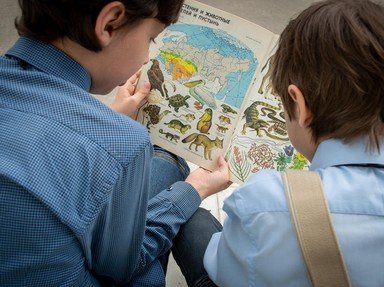Quiz Answer Key and Fun Facts
1. Biochemistry is an important topic and is named for two other sciences. Which two sciences are these?
2. There are lots of molecules that are important to biochemistry, but few are as famous as this one! This molecule looks like a twisted ladder (called a "double helix" by scientists) and is made up of genes. What molecule is this?
3. Proteins help to build our bodies and keep us alive. They exist in many forms and are made up of smaller parts called amino acids. How many different amino acids are coded for by our genes?
4. One tough and strong protein is keratin. We all have keratin, though some have more than others! Keratin can be found on our heads and some people have lots of keratin on their faces. What part of our bodies is most likely to contain keratin?
5. Proteins can fold up into tight balls which look like a complicated mess, but which are very special and help our bodies carry out chemical reactions very, very quickly. What are these proteins called?
6. Fats do many important jobs in our bodies and, without them, we would not survive long. What scientific word is often used instead of "fat"?
7. Another important group in biochemistry is the carbohydrates. What "sweet" word is used for small carbohydrates?
8. Biomolecules like proteins and carbohydrates need to interact with themselves and each other. Which of these is an important bond which allows these interactions to take place?
9. Biomolecules can be converted (or metabolised) into a molecule which is a chemical store of energy. What name is given to this molecule? (It is also the answer to "twenty pence multiplied by four").
10. The periodic table contains over 100 elements, but only three of these elements are always found in fats, DNA, protein, and carbohydrates. Two of these are hydrogen and oxygen (the same two elements that make up water). What is the third?
Source: Author
doublemm
This quiz was reviewed by FunTrivia editor
NatalieW before going online.
Any errors found in FunTrivia content are routinely corrected through our feedback system.

